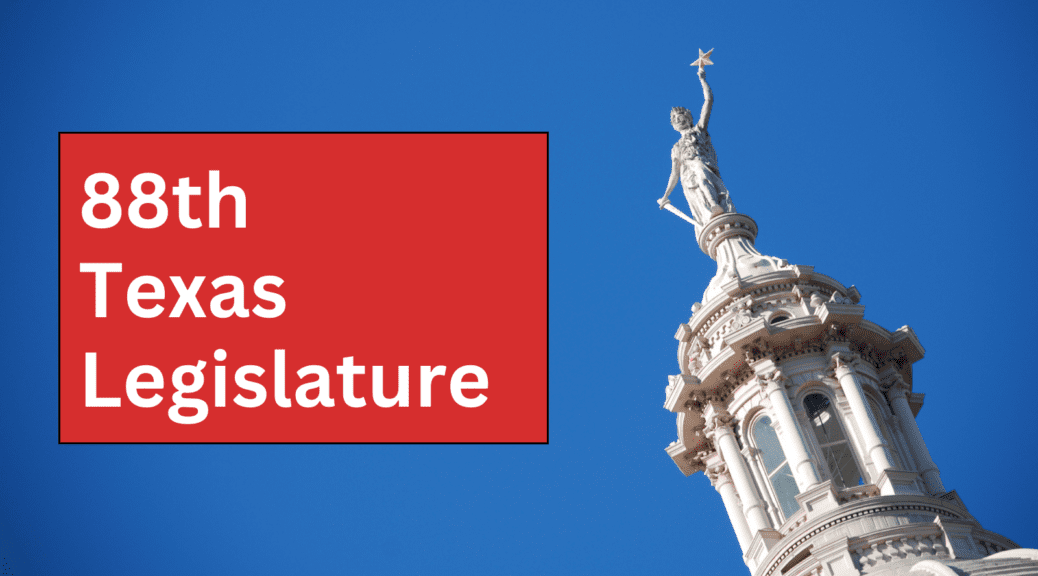
Back to March 2023 Dairy Dispatch
Around the Texas Capitol
Passage of deadlines plus more than 7,000 bills filed sets the stage for a fast and furious session pace
By Lauren Fairbanks and J Pete Laney
TAD Governmental Affairs
We can officially mark off the first of many significant legislative deadlines. Friday, March 10, was the last day that a non-local bill could be filed. It also marked the end of the moratorium on the consideration of non-emergency items in the first 60 days of a legislative session.
If you have been to the Texas Capitol this session, you already know that the crowds are back and may even be above pre-pandemic levels. Bill filing is also one for the record books. The Texas House topped 5,000 bills filed for the first day, hitting 5,497. Bill filing numbers, as well as referrals to committee, are well above where they were last session. At the March 10 deadline, a total of 7,857 House and Senate bills had been filed. Over 1,000 bills were filed in the last week alone.
| Bills and Joint Resolutions | 87R (11/9/20-3/12/21) | 88R (11/14/22-3/10/23) |
| House Filed | 4,728 | 5,497 |
| Senate Filed | 2,191 | 2,657 |
| Total Filed | 6,919 | 8,154 |
| House Referred | 1,979 | 2,482 |
| Senate Referred | 1,001 | 1,381 |
| Total Referred | 2,980 | 3,863 |
With the stage set and the bulk of the work still ahead, the remaining two and a half months will see a furious pace as each chamber works to get its priorities through the process and lawmakers push for their own personal priorities to make it across the finish line by the May 29 close of the legislative session.
The Senate passed its first two bills of the session on March 8. The House is taking a different approach and is not anticipated to have its first Floor Calendar until the last week of March. Meanwhile, committee work is underway and will only continue to get busier ahead of the next major deadline. May 8 marks the last day for House committees to report HBs/HJRs.
Several pieces of legislation that we will be working for the Texas dairy industry include:
- HB 2827by Rep. DeWayne Burns (R-Cleburne), relating to the permitting of and performance of annual soil tests for certain concentrated animal feeding operations by the Texas Commission on Environmental Quality.
- HB 692 by Rep. Glenn Rogers (R-Graford)/SB 872 by Sen. Drew Springer (R-Muenster) relating to the authorization for certain land applications and disposal of dairy waste. This measure is identical to one that passed the House last session and was on its way to passage on the Senate Local Calendar before ultimately getting caught up in the politics between the House and Senate late in the session. View TAD’s one pager on the bills here.
Other items of interest include:
Water for Texas Fund Bills
SB 28/SJR 75 by Sen. Charles Perry (R-Lubbock) and HB 10/HJR 130 by Rep. Tracy King (D-Uvalde) create the Water for Texas Fund at the Texas Water Development Board (TWDB). The fund is intended to boost water infrastructure projects across the state and increase water supply for the future. The fund will use existing programs to disperse grants and loans to small and mid-sized entities seeking assistance with water infrastructure. Additionally, the bill directs the Board Members to use a portion of the fund for new water supply projects such as produced water, brackish, and marine desalination facilities; water from neighboring states; and new technologies to create water supply not currently accounted for in Texas. Perry said the new bill would use money from the state’s budget surplus.
House and Senate File Property Tax Relief Bills
Both chambers filed bills intended to reduce property taxes, with each having slightly different approaches.
Senate: Sen. Paul Bettencourt (R-Houston) announced the filing of SB 3 and SJR 3, which would increase the Homestead Exemption from $40,000 to $70,000. SB 3 is part of Lt. Gov. Dan Patrick’s top 30 session priorities, and all 31 Texas senators have signed onto them as joint authors. SB 3 and SJR 3 are projected to save Texas homeowners $4.72 million on every homestead property tax bill by raising the ISD homestead property tax exemption to $70,000. The bill cost estimate is $3.5 billion. This bill is expected to save every homestead $341 a year on top of the existing exemption, $454 totaling $795 per year in these exemptions, driving down property tax bills.
House: HB 2, also known as the Property Tax Relief Act, was filed by Rep. Morgan Meyer (R-Dallas). It would lower school district property taxes by 28% and reduce the limit on annual appraisal increases to 5% for all types of property in the state, shielding homeowners, small business owners and other property owners from sudden increases in values to their property that are oftentimes unsustainable. HB 2 would result in the largest property tax cut in Texas history, saving homeowners in the state $460 on their annual property tax bill in 2024, which would grow to $590 in 2025. Additionally, HJR 1 was filed and would put HB 2 on the Texas ballot if passed by the Legislature, leaving it up to voters to decide whether it is adopted as state law.
House Speaker Dade Phelan argues the House’s approach would be more meaningful by tightening the appraisal cap and applying it to businesses, farms and second homes in addition to homesteads. Lt. Gov. Patrick says actions taken by the Legislature four years ago already limit how much revenue that school districts, cities and counties can derive from property taxes and that the House’s proposed appraisal caps are no longer needed. In their “base budgets” filed last month, both the House and Senate set aside $15 billion for property tax relief, with $5.3 billion of that being spent to maintain relief lawmakers passed in 2019.